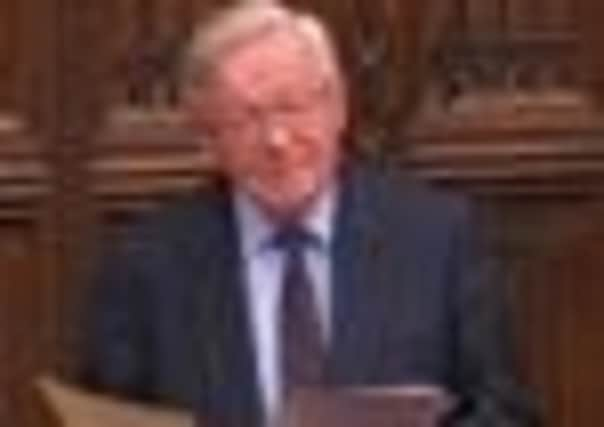Peers: Independent Scotland will not influence Bank


Peers including a former chancellor came to the conclusion in a report on the economic implications for the UK, assuming Scotland votes for independence in September next year.
The House of Lords Economic Affairs Committee also accused both the UK and Scottish governments of being part of a “conspiracy silence”, failing to level with voters north of the Border about economic impact of a “yes” vote.
Advertisement
Hide AdAdvertisement
Hide AdThe committee’s chairman Lord MacGregor warned that voters in all parts of the UK were “sleep walking” towards possible break up of the UK without realising what the consequences are.
The reporta voided taking sides in the referendum debate.
But it pointed out that the debt and liabilities held by in an independent Scotland would be 123 per cent of GDP – a level committee claimed would be “a major issue” for a small country with no borrowing history.
But the debt/GDP ratio for the rest of the UK would be worse at 147 per cent because Scotland would receive a geographical share of North Sea oil and gas assets.
The report said that the choice of currency was “the most important economic decision an independent Scottish Government would face.”
It described the SNP’s plans of being able to influence the Bank’s Monetary Policy Committee and having a Scottish representative on it as “entirely fanciful” and “devoid of precedent.”
It said that effective governance of the currency “requires a monetary policy committee”.
But it was dismissive of the Scottish Government’s plans to continue with the Bank of England as a lender of last resort, using the UK pound as it the currency.
It said it was “difficult to see how the UK Government would extend central banking services to an independent Scotland since the UK government would lack control over tax and spending policies of an independent Scotland.”
Advertisement
Hide AdAdvertisement
Hide AdThe committee was also highly critical of the SNP Scottish Government for not accepting the letter from President of the European Commission Manuel Barroso that Scotland would have to apply for EU membership.
It warned that the EU entry negotiations could be “protracted and complex.”
It also appeared to question the SNP’s two year timetable for independence negotiations claiming they ”could take years.”
The committee said the risks to the economy are greater for Scotland and easily identifiable but the “upside is uncertain”.
But the report also called on the Ministry of Defence to be “much more proactive” detailing the implications of a yes vote and warned that it could lead to the loss of 25,000 defence jobs north of the Border.
Lord MacGregor said: “We hope that our report provides a road map for all the key issues – single market, division of assets and liabilities, North Sea oil, currency, taxation and debt, international issues including membership of the EU and defence.
“Many of these issues could not be clarified – if there is a Yes vote – until after negotiations following such a vote. So we recommend in particular that the Scottish and British Governments should indicate the ‘red lines’ of their negotiating stance on them before the referendum so that voters can make an informed choice.
“We do not take a position on whether voters should vote Yes or No on September 18 2014 but they deserve to cast their vote based on a proper understanding of the possible economic impact. At present they do not have the information to do so.”
The Institute of Chartered Accountants (ICAS) said that the report was “a wake up call”.